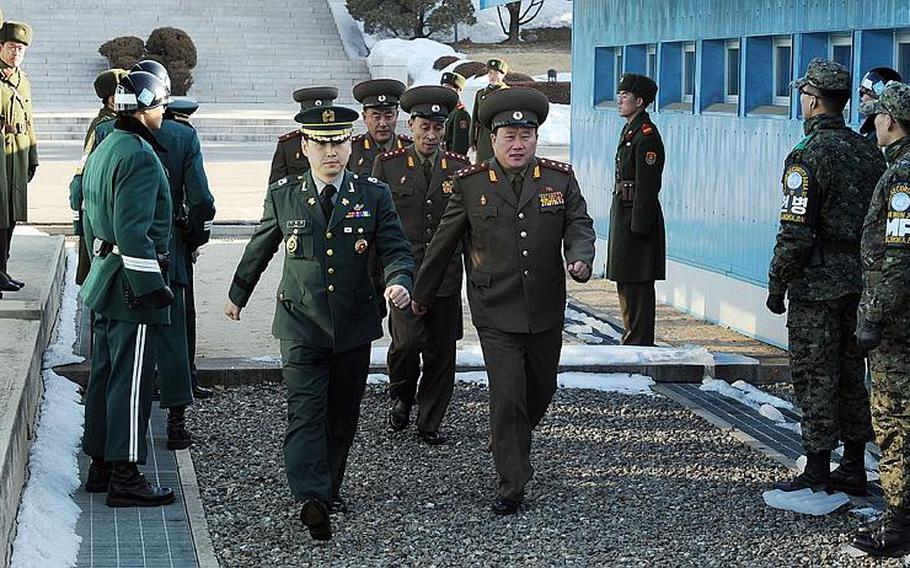
North Korean military officials, accompanied by a South Korean officer and flanked by South Korean troops, march across the North-South Korea border for a second day of talks. The meetings are being held to set a date and agenda for future higher-level military talks about the sinking of a South Korean warship last spring and North Korea´s bombing of a South Korean island in November. (Courtesy of the Ministry of National Defense )
SEOUL — Military talks between North Korea and South Korea collapsed Wednesday after the North Korean delegation abruptly walked out of the meeting, following a disagreement over whether the North was to blame for the sinking of a South Korean warship and the shelling of a South Korean island last year, according to the Ministry of National Defense.
There were no further plans for additional meetings between the two militaries that began discussions Tuesday at the Demilitarized Zone in hopes of easing tensions on the embattled peninsula.
The meetings were intended to set a date and agenda for higher-level military talks, but the North Korean officers walked out of the meeting Wednesday at 2:30 p.m.
Further details were not immediately available. Independent journalists were not allowed to cover the talks.
“This is not what I expected,” said Choi Jin-wook, senior North Korea analyst at the Korea Institute of National Unification. “I thought we could move forward to higher-level talks because North Korea was so desperate and South Korea was not so reluctant to move forward.”
There were encouraging signs of improved relations earlier in the day, when the two Koreas agreed to discuss reunifying families separated by the Korean War. However by late afternoon, it was unclear whether the Red Cross-sponsored family reunion talks would take place because of the failed military talks, said Lee Jong-joo, spokeswoman for the Ministry of Unification.
The date and location of the family reunion talks were to be set after higher-level military talks ended, she said.
This week’s military meetings took place after one of the most tumultuous periods between the two nations since the Korean War.
North Korea launched an artillery strike against Yeonpyeong Island on Nov. 23, killing two civilians and two South Korean marines. The North claimed it attacked in self-defense because of an ongoing South Korean military exercise. South Korea, however, claims it never fired toward the North.
A few months earlier, a South Korean-led international investigation, which included analysts from the U.S., Australia, the United Kingdom and Sweden, found that a North Korean submarine came into South Korean waters on March 26 and fired a torpedo, splitting the South Korean warship Cheonan in half and killing 46 sailors. North Korea has repeatedly denied any involvement in the attack.
Following months of angry rhetoric that included a threat of nuclear war, North Korea has taken a more conciliatory tone in recent weeks. South Korean officials initially said they would not hold military talks until North Korea acknowledged its role in the Cheonan and Yeonpyeong incidents, but later agreed to hold the talks as a way of testing the North’s sincerity.
President Lee Myung-bak said last week that an inter-Korean summit was possible if the North ceased its pattern of launching attacks and then demanding food aid in exchange for peace.
Choi said North Korea likely was not ready to make concessions on the Cheonan and Yeonpyeong Island issues, but would likely look for other ways to hold high-level talks because it needs food aid.
The Red Cross talks could pave the way for higher-level talks between the Koreas.
“Red Cross talks for family reunions are the biggest gift that North Korea can give to South Korea,” Choi said. “It’s not just family reunions, it’s more than that. They could continue on to higher talks.”
But Baek Seung Joo, head of the Center for Security and Strategy at the Korea Institute for Defense Analyses, said he didn't expect this week's negotiations to be successful, though he does expect the Koreas to hold more discussions in the future.
He said North Korea pushed too hard in this week's negotiations because it wanted something to show before dictator Kim Jong Il's birthday on Feb. 16.
"North Korea's military rushed due to domestic politics," Baek said.